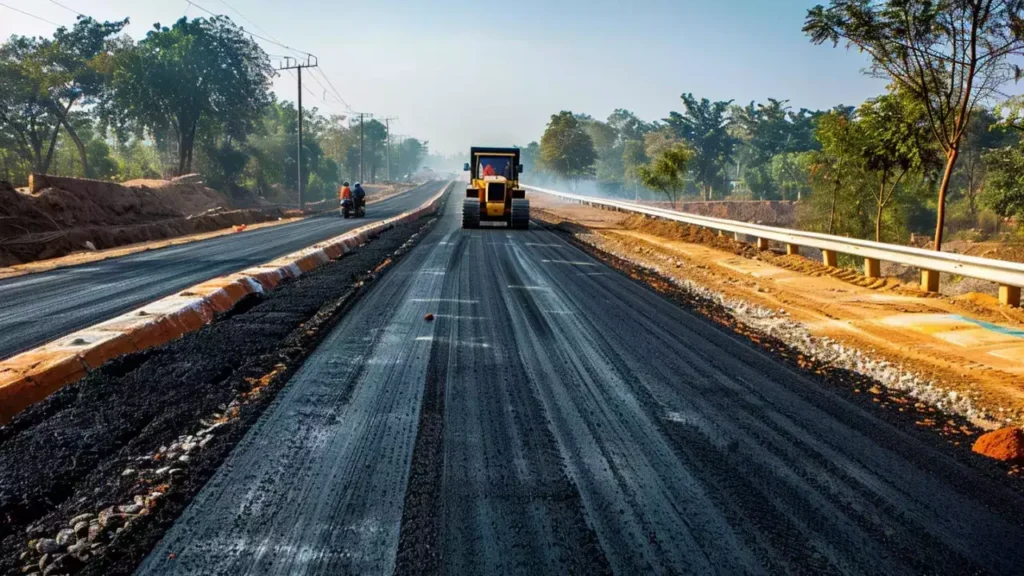Table of Contents

Introduction
India is setting a global example in sustainable infrastructure development with the inauguration of its first bio-bitumen-based National Highway stretch on NH-44 in Mansar, Nagpur, Maharashtra. This landmark project, spearheaded by Union Minister for Road Transport and Highways, Nitin Gadkari, represents a groundbreaking leap in road construction technology and environmental sustainability.
This highway is constructed using lignin-based bio-bitumen technology, a revolutionary innovation developed by Praj Industries in collaboration with CSIR – Central Road Research Institute (CRRI), National Highways Authority of India (NHAI), and Oriental. This milestone is not just a technical achievement but also a significant step toward realizing India’s goals of Aatmanirbhar Bharat (self-reliant India) and environmental sustainability.
A Technological Breakthrough: Bio-Bitumen Technology
The NH-44 stretch in Mansar is the first in India to utilize lignin-based bio-bitumen technology for road construction. This innovation leverages lignin, a by-product of plant biomass, to replace conventional fossil-based bitumen, which is typically used as a binder in flexible pavements.
Key Features of Bio-Bitumen Technology:
- Sustainable Binder: Lignin, derived from agricultural and lignocellulosic biomass, serves as a renewable and eco-friendly binder.
- Environmental Impact: The technology can reduce greenhouse gas emissions by up to 70% compared to traditional bitumen.
- Cost-Effectiveness: It reduces dependency on imported bitumen, which currently accounts for 50% of India’s total bitumen requirement.
- Scalable Application: This technology provides a sustainable solution to road construction while addressing raw material scarcity.
The collaboration between Praj Industries and CSIR-CRRI demonstrates India’s potential to innovate and adopt cutting-edge technologies in infrastructure development.
Sustainability and Environmental Benefits
The introduction of this highways aligns with India’s commitment to sustainable development and environmental conservation.
Lignin: A Green Alternative
Lignin is a plant-based material that is abundantly available in agricultural residues. Utilizing lignin in bio-bitumen production provides a sustainable alternative to petroleum-based bitumen.
Reduction in Pollution:
- The use of this minimizes carbon emissions during production and application.
- It addresses the pressing issue of stubble burning, especially in states like Punjab and Haryana, by using agricultural waste such as rice straw.
Waste to Wealth:
- It’s production transforms waste agricultural residues into valuable resources.
- Farmers benefit financially by selling agricultural waste, which would otherwise contribute to pollution through burning.
Combatting Climate Change:
With the potential to significantly lower greenhouse gas emissions, bio-bitumen technology contributes to India’s fight against climate change. This is particularly critical as the nation seeks to achieve its net-zero carbon emissions target by 2070.
Economic and Agricultural Impacts
The development of this highways offers immense economic and agricultural benefits.
Empowering Farmers:
Agricultural waste, such as rice straw, is a key input for bio-bitumen production. This initiative provides an additional revenue stream for farmers, transforming them into ‘bitumendata’ (producers of bio-bitumen) alongside their traditional roles as ‘annadata’ (food providers) and ‘urjadata’ (energy providers).
Reduction in Stubble Burning:
By utilizing crop residues in bio-bitumen production, the initiative helps tackle the recurring issue of stubble burning, a major contributor to air pollution in northern India.
Job Creation and Economic Growth:
The large-scale production of bio-bitumen and the expansion of related projects have the potential to create jobs in rural and urban areas. This aligns with India’s vision of inclusive and sustainable economic growth.
A Vision for Aatmanirbhar Bharat
Union Minister Nitin Gadkari emphasized that the bio-bitumen highway project is a testament to Prime Minister Narendra Modi’s vision of Aatmanirbhar Bharat. The initiative is a step toward reducing India’s reliance on imported fossil-based bitumen while promoting domestic production of sustainable alternatives.
Self-Reliance in Infrastructure Development:
India imports about 50% of its bitumen requirements, making the development of bio-bitumen technology a strategic move to achieve self-reliance. By producing bio-bitumen domestically, India can reduce its import bill while fostering innovation and sustainability.
Boost to Bio-Refineries:
The use of lignocellulosic biomass in bio-bitumen production generates additional revenue for bio-refineries. This encourages the growth of bio-economy sectors and supports the country’s transition to a greener economy.
Integration with Other Green Initiatives
The bio-bitumen highway is not an isolated project but part of a broader strategy to integrate green technologies into India’s infrastructure development.
CNG from Biomass:
Minister Gadkari highlighted the role of Compressed Natural Gas (CNG) projects in reducing pollution and promoting cleaner energy.
- Over 400 CNG projects are currently underway across the country, utilizing biomass to produce cheaper and cleaner fuel.
- Approximately 60 lakh tonnes of agricultural waste have been used in these projects, showcasing their scalability and environmental benefits.
Green Highways Mission:
The National Green Highways Mission complements the bio-bitumen initiative by promoting tree plantation along highways, further enhancing environmental sustainability.
Global Significance of Bio-Bitumen Highways
This highway is not just a national achievement but a significant contribution to global sustainability efforts. By pioneering this technology, India positions itself as a leader in sustainable infrastructure and offers a replicable model for other countries.
Inspiration for Developing Nations:
Many developing nations face similar challenges related to pollution, agricultural waste, and infrastructure development. India’s success with bio-bitumen technology can serve as an inspiration and a template for these nations.
Showcasing Indian Innovation:
The project highlights India’s capability to innovate and adopt cutting-edge technologies, bolstering its reputation on the global stage.
Conclusion
The inauguration of India’s first bio-bitumen-based National Highway stretch on NH-44 in Nagpur is a defining moment in the country’s journey toward sustainable and self-reliant infrastructure development. By leveraging lignin-based bio-bitumen technology, the project addresses critical issues such as environmental degradation, import dependency, and stubble burning.
The initiative embodies the principles of Aatmanirbhar Bharat, empowering farmers, fostering innovation, and promoting economic growth. With the potential for nationwide implementation, bio-bitumen highways could revolutionize India’s road construction sector and set a benchmark for sustainable infrastructure globally.
As India paves the way toward greener highways, it also takes a significant step closer to a cleaner, healthier, and more sustainable future.
Noodlemagazine This is my first time pay a quick visit at here and i am really happy to read everthing at one place